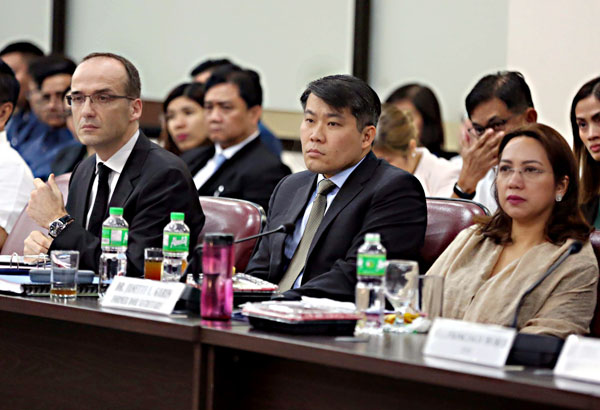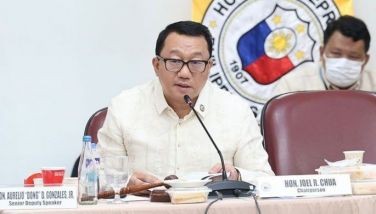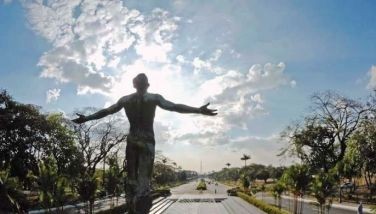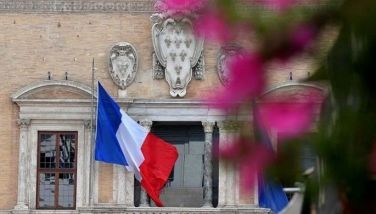Sanofi rejects full refund, indemnity

Top photo shows (from left) Sanofi Pasteur-Asia Pacific head Thomas Triomphe, Sanofi regional medical head Ta-Wen Yu and former health secretary Janette Garin attending the House hearing yesterday on the purchase of P3.5-billion dengue vaccines. Boy Santos
MANILA, Philippines — French pharmaceutical company Sanofi Pasteur yesterday turned down the demands of Health Secretary Francisco Duque III to refund P3 billion for used Dengvaxia and to set up an indemnification fund for children administered the anti-dengue vaccine.
“Sanofi Pasteur responded to the request that we refund the government for the used doses of Dengvaxia and financially support an indemnification fund. In our letter to the DOH (Department of Health), we respectfully declined both requests,” Sanofi said in a statement yesterday morning.
The company noted that when it agreed to reimburse the Philippine government for unused doses of Dengvaxia, “we did so to show our continued commitment to cooperate with the DOH in ensuring the best possible health outcomes for the people of the Philippines.”
Sanofi maintained that this “decision was not due to any safety or quality concerns about the Dengvaxia vaccine.”
“Agreeing to refund the used doses of Dengvaxia would imply that the vaccine is ineffective, which is not the case,” it added.
The company stressed that “the data remains quite clear that in absolute terms, dengue vaccination in the Philippines will provide a net reduction in dengue disease, including severe dengue and thereby reduce the overall public health burden associated with this disease.
“For that reason, if the DOH decides to reinstate the community-based dengue vaccination program following a more complete evaluation of the new data on the vaccine, Sanofi Pasteur would be willing to provide new doses of the vaccine free of charge,” the company said.
These new doses, according to Sanofi, would allow people who previously received one or two doses of the vaccine in the public program to complete the three-dose schedule and “thus, have the opportunity to benefit from the full potential of Dengvaxia’s ability to protect against dengue.”
“As for the indemnification fund, there are no safety or quality concerns about the Dengvaxia vaccine,” it added.
Citing the findings of the expert panel of the University of the Philippines-Philippine General Hospital (UP-PGH), Sanofi said there is no evidence directly linking the Dengvaxia vaccine to any of the 14 deaths.
“Sanofi has always followed the highest ethical standards and should there be any case of injury due to dengue that has been demonstrated by credible scientific to be casually related to vaccination, we will assume responsibility,” Sanofi maintained.
No EU registration
The refusal to refund came as Sanofi yesterday admitted before the House of Representatives that it imported in 2015 the purported Dengvaxia vaccine to the Philippines without being registered by the European Union.
“We have nothing to do in its process. Looking at the geographic situation of France and the borders of France, it is not a priority by the European Union,” Sanofi Pasteur Asia-Pacific head Thomas Triomphe told the House committee on good government.
Triomphe told the panel headed by Surigao del Sur Rep. Johnny Pimentel that Dengvaxia is still in the process of certification.
“Every single national regulatory agency decides on its own when to license another product,” Triomphe said.
Triomphe reiterated that there was apparently no urgency for such registration with the European Medicines Agency – the counterpart of the Philippines’ Food and Drug Administration – precisely because Dengvaxia’s safety and efficacy have been demonstrated.
But Iloilo Rep. Ferjenel Biron, a doctor by profession, was unconvinced, insisting that Manila should not have accepted Dengvaxia in the previous administration because it had not been approved by the European FDA.
“We’re talking of a product, a biological product whose safety and efficacy has not been established even from the country of origin. If it’s not registered in Europe, then what business do we have importing this product here?” he asked.
The FDA said the agency approves a lot of vaccines and medicines that have not been registered with the country of origin, as long as they pass certain standards and requirements.
“Not only vaccines but also medicine in general that we approved if there is proof of good manufacturing practice compliance and are freely zoned,” FDA’s Melody Samudio told members of the Pimentel committee.
“Other than these administrative documents, we have more requirements like… quality, safety and efficacy, and these have been satisfied,” she further explained.
Confrontation try
Several mothers who attended yesterday’s hearing attempted to confront former health secretary Janette Garin after she left the hearing.
But the irate mothers of children vaccinated by Dengvaxia during Garin’s time were not able to catch up with her as the elevator closed when they were about to approach her at the South Wing Annex of the Batasang Pambansa complex in Quezon City.
The hearing was held at the Speaker Feliciano Belmonte Hall.
Also yesterday, Nueva Ecija Rep. Estrellita Suansing asked Health Undersecretary Rolando Enrique Domingo if they are going to file criminal charges against Sanofi.
“What we are doing now is we want to look at the case, the vaccine and the dengue deaths. I think the UP-PGH panel needs to do some tests first so that this can give more solid and definitive findings before filing cases,” Domingo said.
“We just need to get some samples, and we are told that tests can be done here,” he added.
Suansing then asked Domingo if the deaths of three children are not enough for criminal charges to be filed against the pharmaceutical giant, noting that more than 800,000 children have been inoculated with Dengvaxia.
Earlier in the hearing, Domingo revealed that of the 14 Dengvaxia recipients who fell fatally ill, three had acquired dengue and eventually died 30 days after inoculation.
“We need to have more evidence and test to be done,” the health official replied.
Suansing said the DOH will appease many parents who fear for the safety of their children who were administered the vaccine.
In the same hearing, Duque mentioned there has been a decline in the number of people availing themselves of immunization due to fears and apprehensions brought about by Dengvaxia.
“Just because of this one controversial vaccine, it has tainted the credibility of the entire DOH immunization program,” he said, adding he has instructed health officials to proceed with their immunization activities.
‘Phl may sue Sanofi’
Meanwhile, the Philippine government may sue Sanofi in an international tribunal over its refusal to grant the refund, Senate President Aquilino Pimentel III said yesterday.
Pimentel said the government may file a “civil case, maybe even in international courts.”
“Let us look at the grievance procedure in the contract (between the government and Sanofi),” Pimentel told reporters.
Sen. Joseph Victor Ejercito, chairman of the Senate committee on health that is conducting an inquiry into the Dengvaxia controversy, renewed his call for experts – not the Public Attorney’s Office (PAO) – to conduct the scientific tests and autopsies on the people who allegedly died or got sick after being injected with Dengvaxia.
“Remember, it’s the pathologist, not the ‘PAOtologist’ who is needed,” Ejercito said in a text message to reporters.
Ejercito said statements from the PAO were not reassuring for parents, whose children have been injected with the controversial vaccine.
Senators expressed concern over reports that many parents refuse vaccination of their children for other diseases in the wake of the Dengavaxia controversy.
This prompted Senate President Pro Tempore Ralph Recto to ask the DOH to use its P634-million advertising budget for this year “to fight the fake news that all vaccines are bad.”
Dengvaxia, according to Sanofi, may be risky to those who have not yet contracted dengue and inoculated with it, depending on the strain that will hit the vaccinated individual.
Recto said the DOH’s “advertising war chest” is big enough “to calm unfounded concerns that immunization causes harm.”
“Science must trump superstition,” he said in calling on the DOH to launch an information drive so that the dengue vaccine flop will not erode public confidence on government healthcare programs.
Recto warned that a “vaccine backlash” would put millions of children, seniors and women at risk.
He said the government is buying P7.4 billion worth of vaccines this year, in quantities that will benefit millions.
“Whether we like it or not, one side effect of this Dengvaxia controversy is that people are asking if the vaccines to be bought using taxpayers’ money are safe,” the senator said.
“I know that they ought to be, but the DOH must still go out of its way to assure the public that vaccines meet the highest standards,” he said. – With Paolo Romero
- Latest
- Trending
































